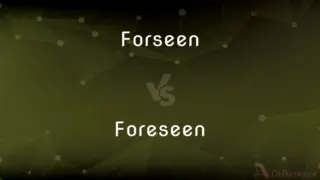Demenor vs. Demeanor — Which is Correct Spelling?
By Tayyaba Rehman — Updated on April 2, 2024
"Demenor" is an incorrect spelling. "Demeanor" is the correct spelling, referring to one's outward behavior or bearing.

Table of Contents
Which is correct: Demenor or Demeanor
How to spell Demeanor?

Demenor
Incorrect Spelling

Demeanor
Correct Spelling
ADVERTISEMENT
Key Differences
Associate “demeanor” with “manner,” both having double consonants in the middle.
Remember that "demenor" lacks the “a” which is essential in “demeanor.”
Visualize the word "deMEANor" with emphasis on "MEAN" to recall its correct form.
“Demeanor” has the word “mean” in it, suggesting how someone might seem or appear.
Think of "mean" within "demeanor," as it's about behavior.
ADVERTISEMENT
How Do You Spell Demeanor Correctly?
Incorrect: The teacher's demenor towards the students was always kind and patient.
Correct: The teacher's demeanor towards the students was always kind and patient.
Incorrect: The suspect's demenor was calm and collected during the interrogation.
Correct: The suspect's demeanor was calm and collected during the interrogation.
Incorrect: I admired his demenor under pressure; it was truly commendable.
Correct: I admired his demeanor under pressure; it was truly commendable.
Incorrect: Her demenor changed drastically when she heard the news.
Correct: Her demeanor changed drastically when she heard the news.
Incorrect: His demenor during the interview was very professional.
Correct: His demeanor during the interview was very professional.
Demeanor Definitions
Demeanor is the way a person appears and behaves in public.
Her professional demeanor impressed the interviewers.
Demeanor can denote the conduct or comportment of an individual.
The suspect's nervous demeanor raised suspicions.
Demeanor signifies one's facial appearance as indicative of mood or emotion.
His stern demeanor was intimidating.
Demeanor refers to the outward behavior or bearing of a person.
His calm demeanor eased the tensions in the room.
Demeanor encompasses the general nature or mood of a person or situation.
The cheerful demeanor of the event made everyone joyful.
The way in which a person behaves; deportment.
(American spelling) The social, non-verbal behaviours (such as body language and facial expressions) that are characteristic of a person.
The man's demeanor made others suspicious of his intentions.
A confident demeanor is crucial for persuading others.
Management; treatment; conduct.
God commits the managing so great a trust . . . wholly to the demeanor of every grown man.
Behavior; deportment; carriage; bearing; mien.
His demeanor was singularly pleasing.
The men, as usual, liked her artless kindness and simple refined demeanor.
(behavioral attributes) the way a person behaves toward other people
Demeanor Meaning in a Sentence
The lawyer's demeanor in court helped win the jury's trust.
His calm demeanor helped diffuse the tense situation.
Her warm demeanor makes her approachable to everyone.
Despite the chaos, her demeanor remained serene.
The actor's off-screen demeanor is quite different from his film characters.
His demeanor softened when he spoke about his family.
She maintained a professional demeanor throughout the meeting.
The customer's aggressive demeanor made the staff uncomfortable.
He has a demeanor that suggests he is always deep in thought.
The nurse's caring demeanor comforted the patients.
A confident demeanor can make a strong impression during an interview.
The principal's friendly demeanor made the students feel welcome.
She carries herself with a demeanor of quiet confidence.
Despite his success, he maintains a humble demeanor.
The diplomat's demeanor was perfectly suited for negotiations.
The speaker's engaging demeanor captivated the audience.
A teacher's demeanor can significantly impact the classroom environment.
A polite demeanor is appreciated in any social setting.
Maintaining a positive demeanor can improve your mental health.
Her authoritative demeanor commands respect.
Demeanor Idioms & Phrases
Professional demeanor
Behaving in a manner that is appropriate and respectful in the workplace.
His professional demeanor during presentations set a good example for the team.
A calm demeanor
Exhibiting a peaceful and composed appearance.
In the face of adversity, she maintained a calm demeanor.
Serene demeanor
Exhibiting a tranquil and peaceful presence.
The meditation teacher's serene demeanor had a calming effect on the class.
Warm demeanor
Exhibiting kindness, affection, and a welcoming attitude.
The host's warm demeanor made everyone feel at home.
Confident demeanor
Showing self-assurance and certainty in one's abilities.
A confident demeanor can help during public speaking engagements.
Aggressive demeanor
Displaying an assertive and possibly confrontational attitude.
The manager's aggressive demeanor in meetings was counterproductive.
Engaging demeanor
Being charming and captivating, holding others' attention.
The tour guide's engaging demeanor made the history come alive.
Positive demeanor
Showing optimism and a positive outlook.
Her positive demeanor was infectious, lifting the spirits of those around her.
Friendly demeanor
Displaying a pleasant and approachable attitude.
Her friendly demeanor made her well-liked among her peers.
Humble demeanor
Displaying modesty and not seeking to draw attention to oneself.
Despite his achievements, he kept a humble demeanor.
Common Curiosities
What is the verb form of Demeanor?
The verb form is "demean."
Why is it called Demeanor?
It's derived from the Old French word "demenour," meaning "manner" or "conduct."
Which vowel is used before Demeanor?
"A" as in "a demeanor."
What is the plural form of Demeanor?
The plural form is "demeanors."
What is the pronunciation of Demeanor?
It is pronounced as dih-MEEN-er.
What is the root word of Demeanor?
The root word is the Old French "demenour."
What is the singular form of Demeanor?
The singular form is "demeanor."
Which conjunction is used with Demeanor?
Any conjunction can be used depending on the sentence's context.
Which preposition is used with Demeanor?
"Of" as in "demeanor of a person."
Is Demeanor a noun or adjective?
Demeanor is a noun.
Is Demeanor an abstract noun?
Yes, it is an abstract noun as it represents a quality or concept.
Is Demeanor a vowel or consonant?
Demeanor is a word, not a single letter. It contains both vowels and consonants.
Is the Demeanor term a metaphor?
No, but it can be used metaphorically in some contexts.
Is the word Demeanor is imperative?
No, it's a noun and not an imperative verb.
Is Demeanor a countable noun?
Yes, e.g., "different demeanors."
How do we divide Demeanor into syllables?
De-mean-or.
What is the second form of Demeanor?
As a noun, it doesn't have verb forms. The noun stays "demeanor."
What is the third form of Demeanor?
Again, as a noun, it doesn't have verb forms. It remains "demeanor."
Is Demeanor a negative or positive word?
Demeanor is neutral; it depends on the context in which it's used.
Is Demeanor an adverb?
No, it's not an adverb.
What is a stressed syllable in Demeanor?
The second syllable, "mean," is stressed.
What part of speech is Demeanor?
Demeanor is a noun.
Which determiner is used with Demeanor?
Any determiner like "his," "her," "the," "a" can be used based on the context.
How many syllables are in Demeanor?
There are three syllables.
What is the opposite of Demeanor?
There's no direct opposite, but "misconduct" can contrast in certain contexts.
Which article is used with Demeanor?
Both "a" and "the" can be used depending on the context.
Is Demeanor a collective noun?
No, it's not a collective noun.
What is another term for Demeanor?
"Manner" or "bearing."
What is the first form of Demeanor?
It's a noun, so it doesn't have verb forms. The primary form is "demeanor."
How is Demeanor used in a sentence?
"Her friendly demeanor made her popular among her peers."
Share Your Discovery

Previous Comparison
Decour vs. Decor
Next Comparison
Shister vs. ShysterAuthor Spotlight
Written by
Tayyaba RehmanTayyaba Rehman is a distinguished writer, currently serving as a primary contributor to askdifference.com. As a researcher in semantics and etymology, Tayyaba's passion for the complexity of languages and their distinctions has found a perfect home on the platform. Tayyaba delves into the intricacies of language, distinguishing between commonly confused words and phrases, thereby providing clarity for readers worldwide.








































